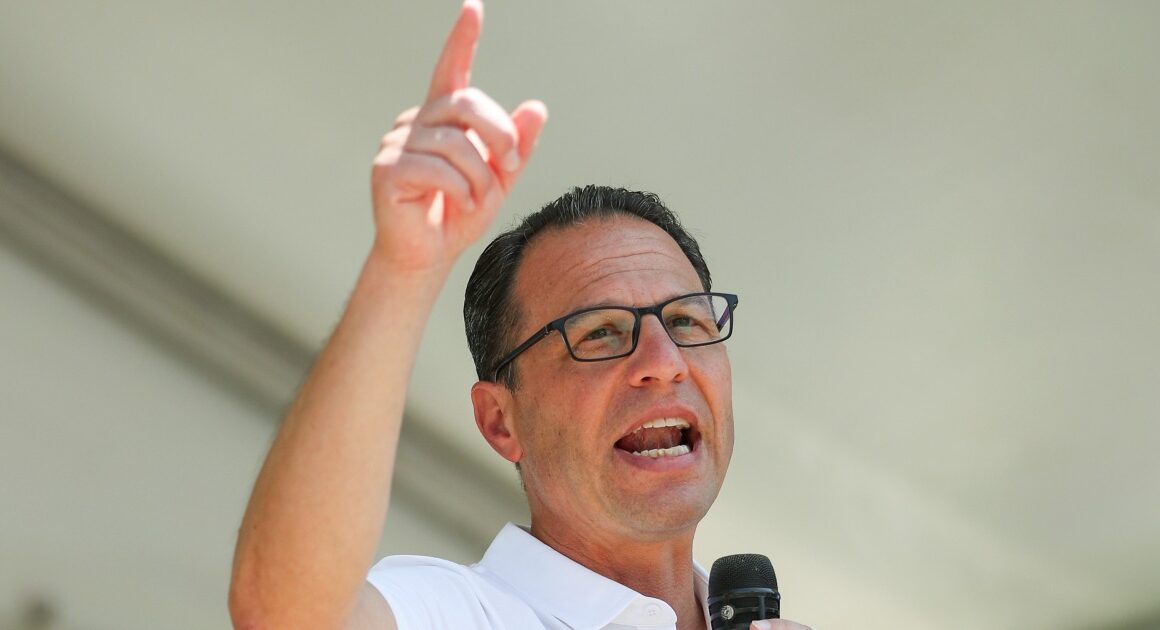AMBLER, Pa. — In the weeks following Hamas’ Oct. 7 attack in Israel, Gov. Josh Shapiro’s message to young Americans protesting the Israeli counteroffensive in Gaza was straightforward: study up on the conflict.
“I don’t blame them for wanting to engage and speak out,” he told NBC News in a November interview, pointing to “disturbing” imagery coming out of Gaza. “I think that’s really healthy. I think it’s incumbent upon them to know some history and not just enter the conversation in recent weeks but go back and understand what happened in the past.”
Eight months later, this vocal segment of the Democratic electorate is closely scrutinizing Shapiro’s record on issues related to Israel, as the Pennsylvania governor emerges as a top contender to serve as Vice President Kamala Harris’ running mate. And it’s become the centerpiece of the left’s case against adding him to the ticket.
The intense scrutiny is the latest chapter in a long-running saga between factions of the Democratic Party who have backed President Joe Biden’s approach to the war in Gaza and those who have staunchly opposed it. It also has rekindled a parallel fight over the rise of antisemitism at home as Shapiro, an observant Jew, has faced deeper skepticism over Israel than other leading contenders who have espoused similar views.
That blending of Shapiro’s Jewish faith with his positions on Israel has bled into voters’ thinking about his potential ascension on the Democratic ticket. Asked about the role left-wing criticism on Israel could play with a Harris-Shapiro ticket, Rick Giordano, a Democratic voter at Shapiro’s Monday rally who supported him as Harris’ running mate, mused about whether the country would elect a Jewish vice president.
“I work construction. A lot of guys are very opinionated,” Giordano said. “So, I would like to see Josh. But I am a little worried with his being Jewish. Doesn’t affect me. I don’t think it affects him. But I worry about the rest of the country if that would hurt the ticket. I hope not.”
For some Democrats, the moment has ripped open wounds that had yet to heal, exposing additional long-term concerns. A number of Democrats who spoke with NBC News would do so only on condition of anonymity to candidly discuss the sensitive issues and the vice presidential selection.
One Jewish Democratic official — who is not advocating for a particular running mate — went as far as saying they were concerned about Shapiro’s potential selection not because they thought he would imperil the ticket but because a Harris and Shapiro victory could lead to an increase in antisemitism.
“The two closest people to the president being Jewish — what long-term impact does that have on us?” this person said, pointing to Harris’ Jewish husband, Doug Emhoff.
Shapiro’s rhetoric and record
If elected vice president, Shapiro would be the highest-ranking Jewish official in U.S. history. He attended Jewish day schools growing up and proposed to his wife in Israel. For years, he has been a steadfast supporter of the Jewish state.
That background led Shapiro to lean into the fight over antisemitism at campus protests over the past year.
Shapiro was deeply critical of how University of Pennsylvania leadership handled antisemitism at demonstrations there, and he called a protest outside of a Jewish-owned Israeli restaurant in Philadelphia a “blatant act of antisemitism,” adding the eatery was “mobbed because its owner is Jewish and Israeli.” ( Former workers said the protest was in part because the restaurant owner ignored concerns about a fundraiser held for an Israeli emergency medical service tied to the Israeli military.)
In a May New York Times interview, Shapiro said that while he did not believe all of the pro-Palestinian campus encampments were explicitly antisemitic, he was disturbed by antisemitic speech being treated differently than other forms of hate speech.
“If you had a group of white supremacists camped out and yelling racial slurs every day, that would be met with a different response than antisemites camped out, yelling antisemitic tropes,” he said.
Jim Zogby, the founder of Arab American Institute and a longtime Democratic National Committee member, thinks Shapiro would “create a problem” for Harris with Arab Americans and others turned off by Biden’s handling of the war in Gaza, pointing to such remarks.
“He’s got the cadence of Obama and the personal style of Bill Clinton, making you feel like you’re [the only] person in the room,” Zogby said. “But I think he stepped on himself with some rhetoric that was just over the top and unnecessarily so.”
It’s not just his language that has upset some activists. As state attorney general in 2021, he went after Ben & Jerry’s when the ice cream company decided to stop selling to Israeli settlements in the West Bank. In May, he revised his administration’s code of conduct, ordering state employees to avoid “scandalous or disgraceful” behavior — which some interpreted as an attempt to stop employees from participating in the demonstrations taking place then.
A Shapiro spokesperson said the revision was not connected to ongoing protests but was part of a longer-standing effort to modernize the state’s code of conduct and did not mark “a change in policy.”
“This amendment provided an opportunity to make clear that the Administration is committed to recognizing Commonwealth employees’ right to free speech while also reminding employees that, as public servants, we have a responsibility to maintain the public’s trust and confidence,” Manuel Bonder, a Shapiro spokesperson, said in a statement.
Hatem Abudayyeh, the national chair of the U.S. Palestinian Community Network and one of the lead organizers planning to march at the Democratic National Convention in Chicago, said he considers Shapiro’s possible selection among the worst possible outcomes of the Democratic vice presidential search.
“Somebody like Shapiro would be an absolute disaster since he essentially has made it seem as if the Palestinians don’t have any rights to freedom or self-determination or anything,” Abudayyeh said. “He criminalizes our community as a whole and our protest movement.”
But Abudayyeh didn’t express enthusiasm for the other contenders, either, highlighting a point that Shapiro allies have made: His actual position on the war doesn’t depart from the views expressed by Biden, Harris and the others in the running to be her No. 2.
“We’re not very excited about the other candidates either,” he said. “There aren’t good choices for us.”
Shapiro is a proponent of a two-state solution in the region and has long branded Israeli Prime Minister Benjamin Netanyahu an impediment to peace, calling him a “ terrible leader” who “has driven Israel to an extreme” in his November NBC News interview. In expressing concern about deaths in Gaza, Shapiro said in March that leaders “ can’t ignore the death and destruction” there.
In a separate statement, Bonder pointed to the governor supporting Israel’s “right to defend itself from the brutal Hamas terrorist attack on October 7 and attacks from other terror groups,” adding Hamas “must immediately return the hostages — and that must happen before there can be peace.” Bonder also pointed to Shapiro’s criticism of Netanyahu as “a deeply flawed leader.”
“Governor Shapiro has been very clear that leaders need to speak and act with moral clarity. He has been forceful in speaking out against hate in whatever form — including antisemitism and Islamophobia — and showing that it has no place here in Pennsylvania,” Bonder said, adding Shapiro “has brought people together, listened, and worked with them to try and keep our communities safe and heard.”
His allies point to his years of fostering relationships with Pennsylvania’s Muslim and Arab American communities. They see the blowup over Israel as a mostly online phenomenon, not one that reflects his broader political standing. Pennsylvania surveys support that view. A Fox News poll released this week found 61% of Pennsylvania voters, including 90% of Democrats, view him favorably — in line with other recent surveys and a 10-point improvement from his standing in the poll in July 2022.
The specter of antisemitism
Supporters also see Shapiro’s stance on Israel and antisemitism at home as a potential benefit for Harris on the ticket, helping to ease concerns from voters who may worry Harris will take U.S. policy on Israel in a different direction. Republicans, who already thought Shapiro was the strongest of her potential running mates, agreed.
“Maybe that balances what she needs,” a Trump ally said. “Having a strong Jewish voice on the ticket helps kind of blunt some of those folks that would be voting for Trump just because of that issue.”
Harris has sought to offer a different tone on the ongoing war than Biden while still aligning with his administration’s policy, vowing she “ will not be silent” on suffering in Gaza after meeting with Netanyahu last week. That same day, Harris also offered a staunch condemnation of a protest near the Capitol that featured demonstrators waving Hamas flags and spray-painting pro-Hamas graffiti, describing “despicable acts by unpatriotic protestors and dangerous hate-fueled rhetoric.”
The Harris campaign did not answer whether Shapiro’s positions on Israel have come up in the vetting process, only saying that she is making her decision based on similar qualities that Biden felt were important when picking her four years ago. On Friday, Shapiro told reporters Harris was “spot on” in her message following her meeting with Netanyahu.
“I think people will get over their s— whoever it is,” a Harris campaign official said. “I just honestly think people are excited and, while everyone has their favorite pick, they’ll unite and move forward.”
Shapiro deflected when asked Tuesday about the prospect of being selected as a Jewish American at this time, saying Harris “will make the best decision for her country.”
One Democratic aide who is Jewish said they were appalled that some were targeting Shapiro in this way, adding the blowback he faces is not coming from a “significant part of the electorate that would actually move the needle in any way.”
“It sounds like a Jewish litmus test, that any type of Jew would not be good enough for them,” this person added.
But Shapiro’s opponents say their issues are broader than just Israel — pointing to his support for school vouchers and his handling of sexual harassment claims against a top legislative aide who resigned last year.
“The issues are broader than what he said about campus protests,” a Democratic elected official from Michigan said. “Labor’s got real issues with him, too, which have been expressed to her, I’m told directly.”
A number of prominent Pennsylvania Democrats have vocally backed Shapiro as Harris’ running mate, and in-state labor leaders, including the president of the state chapter of the American Federation of Teachers, published a letter of support.
“Though the VP pick won’t alter Harris’ policy positions, Shapiro’s views on charter schools, criticism over his handling of sexual harassment, and comparing student protesters to white supremacists risk alienating key party constituencies,” said Waleed Shahid, the former spokesperson for the left-wing group Justice Democrats. “He’s facing a perfect storm, and there are less controversial choices available.”
Shapiro’s opponents insist that their criticism is aimed at his policy choices and rhetoric and not his being Jewish — pointing to the relative lack of criticism aimed at Illinois Gov. JB Pritzker, another running mate contender who is Jewish. ( Pritzker’s home was targeted by protesters earlier this year.) But rank-and-file voters made the connection between Shapiro’s religion and the focus on his Israel stances.
“I am a little worried about that, given that he is Jewish, and he obviously will lean towards supporting Israel, in spite of all the Palestinians that have been killed in this,” Robyn Allen-McKinnon, a 63-year-old Democratic voter who attended Shapiro’s Monday rally in support of Harris, said when asked if she had concerns about the pushback. She ultimately said she’d be happy with a handful of different VP picks, including Shapiro.
Others expressed fear that the country simply wasn’t ready for such a diverse ticket.
“I really fear that our country isn’t ready for a Black, Asian woman president and a Jewish vice president,” Linda LaVay, a 64-year-old voter from Upper Gwynedd, Pennsylvania. She felt Israel would be “a big issue.”
David Kedson, a 64-year-old Democrat from Montgomery County, said the war in Gaza is a “lose-lose” for the party — and that no matter how Democrats approach it, some will feel alienated.
“I think they’re talking about Josh Shapiro’s views, because he’s Jewish,” Kedson said, adding, “There’s an undercurrent of antisemitism there that I don’t want involved in the presidential race.”
Allan Smith and Emma Barnett reported from Ambler, Pennsylvania; Jonathan Allen and Julie Tsirkin reported from Washington; Alex Seitz-Wald reported from Camden, Maine; and Adam Edelman reported from New York.
,














